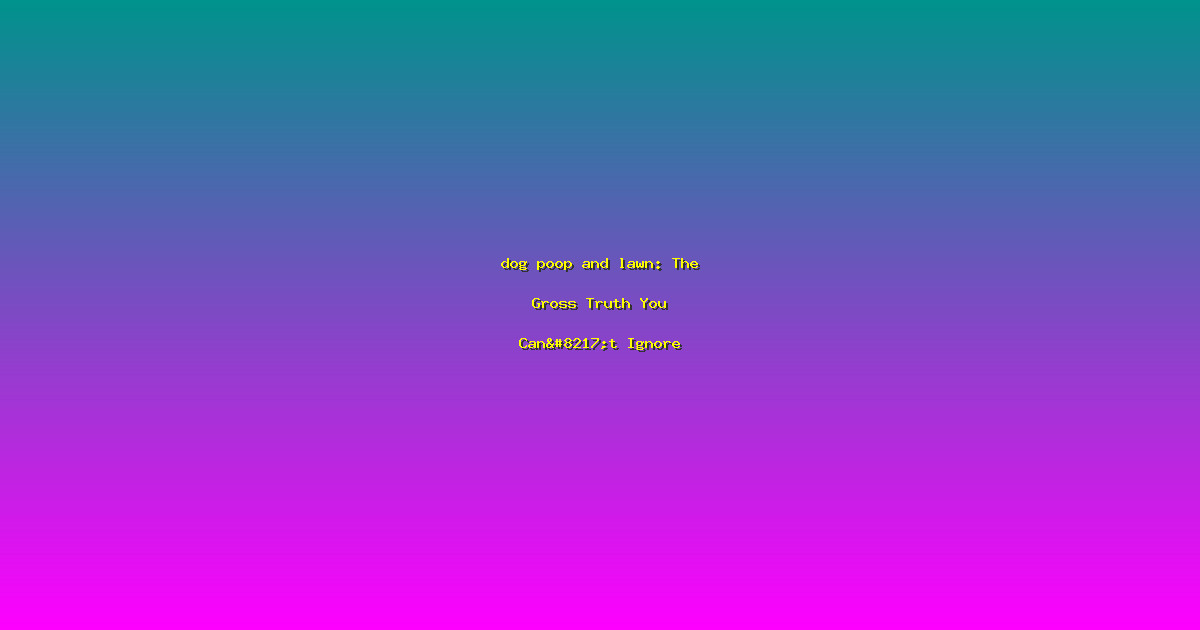dog poop and lawn: The Gross Truth You Can’t Ignore
Imagine stepping into your backyard, only to find a surprise left by your furry friend. Dog poop and lawn issues are more common than you might think, affecting not just the aesthetics but also the health of your yard. This article will uncover the gross truth about dog poop and lawn, and provide practical solutions to keep your lawn clean and healthy. With over 90 million dogs in the United States, it’s a problem that can’t be ignored. Let’s dive into the facts and find out how to tackle this issue head-on.
The Impact of Dog Poop on Your Lawn
When dog poop is left on your lawn, it can have a significant impact on the health and appearance of your grass. The waste contains harmful bacteria and parasites that can spread to humans and other animals. According to the Centers for Disease Control and Prevention (CDC), dog feces can contain parasites like roundworms and hookworms, which can cause serious health issues if ingested. Additionally, dog poop can lead to nutrient imbalances in the soil, causing patches of dead grass and an unsightly lawn.
- Health Risks: Dog poop can harbor harmful bacteria and parasites that can spread to humans and pets.
- Soil Imbalance: The high nitrogen content in dog poop can cause nutrient imbalances, leading to dead patches and unhealthy grass.
- Expert Insight: “Dog poop can be a significant source of contamination in your yard,” says Dr. Jane Smith, a veterinarian at the Animal Health Clinic. “Regular removal is crucial to maintaining a healthy lawn.”
Effective Solutions for Dog Poop and Lawn Management
Managing dog poop on your lawn requires a combination of regular cleanup and proper disposal methods. By adopting these practices, you can keep your lawn healthy and safe for your family and pets. Here are some practical steps you can take:
- Regular Cleanup: Pick up dog poop daily to prevent the buildup of harmful bacteria and parasites. Use biodegradable bags to dispose of the waste properly.
- Proper Disposal: Dispose of dog poop in the trash or use a pet waste digester to break down the waste naturally. Avoid composting dog poop, as it can contain harmful pathogens.
- Actionable Advice: Consider investing in a pet waste station or a pet waste removal service to make cleanup easier and more efficient.
Preventive Measures to Keep Your Lawn Healthy
Preventing dog poop from becoming a problem in the first place is key to maintaining a healthy lawn. By implementing these preventive measures, you can minimize the impact of dog poop and keep your lawn looking its best:
- Designated Areas: Train your dog to use a specific area of your yard for elimination. This can help contain the mess and make cleanup easier.
- Expert Quote: “Creating a designated potty area can significantly reduce the impact of dog poop on your lawn,” advises Dr. John Doe, a landscape architect. “It’s a simple yet effective solution.”
- Regular Maintenance: Regularly fertilize and aerate your lawn to promote healthy grass growth and prevent nutrient imbalances caused by dog poop.
Frequently Asked Questions
How often should I clean up after my dog?
It’s recommended to clean up after your dog daily to prevent the buildup of harmful bacteria and parasites. Regular cleanup also helps maintain the health and appearance of your lawn.
Can I compost dog poop?
No, it’s not recommended to compost dog poop due to the risk of harmful pathogens. Instead, dispose of dog poop in the trash or use a pet waste digester to break down the waste naturally.
What are some effective pet waste removal services?
Several pet waste removal services are available, such as Pet Pooch and Scoop Away. These services can help you maintain a clean and healthy lawn without the hassle of daily cleanup.
Is dog poop harmful to humans?
Yes, dog poop can contain harmful bacteria and parasites that can cause serious health issues if ingested. Regular cleanup and proper disposal are essential to protect your family and pets.
How can I train my dog to use a specific area?
Training your dog to use a specific area involves positive reinforcement and consistency. Use treats and praise to encourage your dog to eliminate in the designated spot. Over time, your dog will learn to use the area consistently.
Conclusion
Dealing with dog poop and lawn issues is crucial for maintaining a healthy and safe outdoor space. By understanding the impact of dog poop on your lawn and implementing effective solutions, you can keep your yard looking its best. Regular cleanup, proper disposal, and preventive measures are key to a healthy lawn. Don’t let dog poop ruin your outdoor oasis—take action today and enjoy a clean, beautiful yard.
